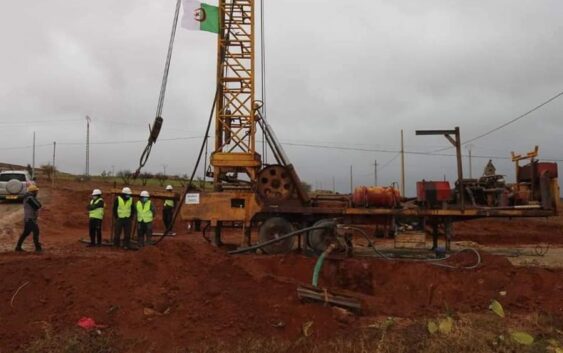- FORMER TOGO PLAYER ADEBAYOR LAUNCH SOCIAL HOUSING PROJECT IN TOGO
- AMANSIE WEST DISTRICT ROAD PROJECT BEGINS IN GHANA
- LAGOS TO CALABAR HIGWAY PROJECT: WHY IT CANT BE ACHIEVED
- NPA SECURE US$700M LOAN FROM CITIBANK FOR REHABILITATION OF APAPA & TIN-CAN PORT
- LIBERIA SENATE TO PROBE WORK MINISTRY OVER UNAUTHORIZED AWARD OF OVER US$21M ROAD CONTRACTS
#9 STRATEGIES DEPLOYED IN RESOLVING WATER SHORTAGES IN ALGERIA

Algeria today, like the countries of the Mediterranean, is experiencing a water deficit caused by climatic changes that have greatly affected the natural cycles of precipitation. This has caused a shortage of rain, which has led to a significant decline in the water level of dams across the country, especially in the central regions and in the western part of the country, with a deficit rate of 25% of the dam reserves.
In order to cover this deficit in drinking water at the level of cities associated with varying rates in the supply of surface water, it was decided, since August 2020, to launch a remedial and urgent program to cover or reduce the surface water deficit by strengthening groundwater production capabilities, as well as using By rehabilitating and expanding seawater desalination plants and implementing new ones in the short term to cover the shortage of drinking water in the concerned states.
Among the measures taken to confront the lack of rain is the adoption of a water diversion system between dams to cover the shortage of needs from the water resource. Among the most important transfers that have been exploited in the supply, we mention the most important of them:
– Diverting water from the Gharib dam to the Borumi dam in Ain Defla to supply Greater Algeria at 80,000 m3 per day.
– Diverting the waters of the Boussiaba dam in Jijel to the Beni Haroun dam to supply both El-Milia and Bellara with a total production estimated at 80 million cubic meters annually.
– Diverting the waters of the Wadi Al-Tah dam in the state of Mascara in order to supply the municipalities of Ain Farrah and the population center of Ain Bouras, Oued El-Abtal and Sidi Abdel-Jabbar.
– Diverting the waters of the Walja Malak Dam in the Tebessa governorate. This system will allow supplying at least 175,000 people with drinking water in the municipalities of Al-Wonza, Al-Ouinat, Boukhadra, Bir Al-Dahab, Al-Marij and Mursat, which has recently entered service.
– Diverting water from the Aghel Amda dam to the Mahwan dam in the state of Setif to supply the municipalities of the state of Bordj Bou Arreridj with 120,000 m3 per day.
– Launching a national tender for the completion of the Tablot Dam water diversion project in the state of Jijel, where this system allows to supply more than 12 municipalities in the state of Setif with drinking water, with a production of approximately 60 million cubic meters annually.
– Launching a national tender for the implementation of the project to divert the water of Sedkaf Derbaldamos in order to supply 11 municipalities located west of Tipasa and 6 municipalities in the states of Ain Defla and Chlef.
– Launching the completion of the project to separate the sea water desalination plant in the Maqtaa from the “Al-Mao” canal, which will be received during the month of July, to enable the citizens of the state to be comfortable with double supply.
– Reconfiguration of the Maqtaa plant to produce 500,000 m3 per day to supply the provinces of Oran, Mascara and Relizane with drinking water.
As for the wilaya of Algiers and its suburbs, the supply system depends on 04 dams, which are Kadara, Beni Amran, Boukerdan and Koudieh Asrdoun when needed, and three supply systems that allow, in normal circumstances, the production of 1.2 million m3 per day, but the quantities of water available in the dams currently only allow achieving daily production ranging between 750-850 thousand m3 per day, which leads to a review of the distribution system in a lined program according to regular times between daily distributions By 8 hours to a day by 14 hours through the various municipalities of the capital.
The water production will improve with the receipt of 173 excavators with an estimated production of 250,000 m 3 per day, which will be supported by a second program that will allow the production of 140,000 m 3 per day through the completion of 120 new excavators, which will gradually enter into service.
Also, between July and August, 4 mono-block seawater desalination plants will enter into service with a production capacity of 37,500 m3 per day, and an urgent program will be completed in the near term for three (03) desalination plants in the municipalities of Qorso, Al-Mahmera and Al-Marsa, with a production capacity equal to 150,000 m3 per day in order to enhance the public water service.
Sial is keen to provide all the conditions by creating a special program, which is to raise production capabilities to put its customers in comfort during religious occasions and holidays, especially the blessed Eid al-Adha, for which a special catering program will be allocated.
This program came to control the management and adapt to the water shortage and the current situation that requires the management and security of water in the longest possible period until the arrival of the autumn and winter seasons. In this context, citizens will be informed through the various media of everything new regarding the public water service. Citizens will also be informed in case of any technical glitches through the various communication channels.

